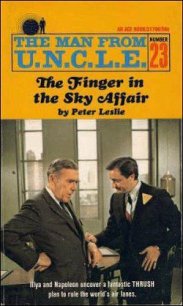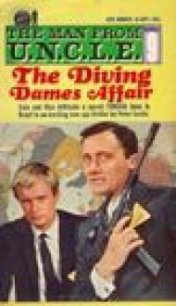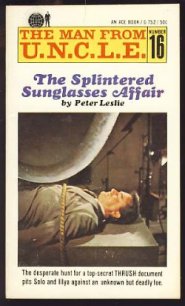[The Girl From UNCLE 04] - The Cornish Pixie Affair - Leslie Peter (электронная книга .txt) 📗
"The books are cooked?" she asked.
"Not so much cooked as incinerated. There's absolutely no relation between the two sets. The ones they show to the auditors and to the tax people show a profit margin so slender that it's only just worth while their going on; the books presenting the real situation show that in fact they're rolling in money. All summer, while they're touring, the loot pours in; and even here in winter, mainly due to low overheads and few staff, they make a healthy little profit!"
"No wonder the old man is always bleating about the lack of trade here in the winter! If he's told me once that nobody spends in Porthallow, he's told me a dozen times!... The two sets of books are quite different, you say?"
"Entirely. And yet, you see — if anyone made a spot check, there are certain sets of figures common to both, certain correspondences... It's quite brilliant: anyone with only the 'official' set, plus the genuine invoices and receipts and so on, would almost certainly pass them. I'd defy anyone to spot it first time — anyone who wasn't already suspicious, that is." He shook his head in reluctant admiration of the brassy Mrs. Bosustow.
"Right," April said crisply, sliding from her perch to the ground. "So we know the old boy and his family had good reason to object to busybodies prying about in the circus, especially police busybodies: they were cheating the income tax authorities in a big way. I guess that lets the old boy out of our net."
"Yes. It seems reason enough both for his surliness and his obstructiveness. What about the murdered son, though?"
April hesitated. "I still think we should have a look around," she said at last. "I know he was a member of the family and this crookery covers him too. But in my view he qualifies for separate treatment on two counts: as the brother of a murder suspect; and as a murder victim himself — whether or not the two are connected."
"Okay, then. We'll go," Mark agreed. "You're sure her caravan's empty?"
"Certain. The widow — your financier of near-genius — is spending a few nights with her sister-in-law. I helped her take over some of her stuff this afternoon. The caravan's at the other end of the—"
"Yes, I've been there, if it's the equestrienne," Mark interrupted. "Her own caravan, the late Harry's that is, is the converted furniture lorry, isn't it?"
"You could call it that — though I imagine the owner would hardly be flattered. The important thing about it, to us, is that there are shutters and curtains on the windows, so that we shan't have to be quite so careful about lights as we have been here."
"Who's next door?"
"By a strange coincidence, I am... on one side. The other side is just trees beyond a fence: the caravan's the end of the line on the side away from the road."
"What, then," Mark said, "are we waiting for?" He replaced the books, slid shut the filing drawers, turned the chair back to face the desk, and held open the door for April.
Ten minutes later, securely shuttered against the outer world, they were sitting at the table where Mark had seen Harry Bosustow going through his candid-camera negatives. The bow legged accountant who wore too much makeup had removed all her ledgers to the hut they had just left, Bosustow's own effects had obviously been removed by the police in the hope that they might yield a clue to his killer, and his wife clearly believed in tidying everything away before she went to stay with friends. In all the glittering array of highly polished veneer cupboards and drawers and shelves, there was neither a personal belonging nor a book nor a picture to be seen.
"Well, I've heard of austere living quarters," Mark said, "but this is ridiculous! Come on: we simply have to something..."
Together, they ransacked the place. They inspected the china and utensils in the immaculate kitchen; they investigated wardrobes; they turned over the neatly ranged contents of drawers. And there was nothing, nothing remotely suspicious, incriminating or even interesting. The private life of the late Harry Bosustow seemed to have been as sterile as his home.
"But, good God, there must be something," Mark exploded at last. "I mean, the chap must have at least had a picture of his nephew or... Hey! That's odd! Now that I come to think of it, where are his photos?"
"What photos?"
"The ones he made his living from. The candid-camera stuff on the seafront and in the circus. Ma getting into a fishing boat to go out after mackerel; Pa having a go at the coconuts. There has to be a detailed filing system for those, with lists of names and addresses to match up with those on the counterfoils of the tickets the photographer gives the mugs after he's taken them. Plus descriptions, plus notes of money received and prints despatched. It's quite a performance — and it takes up a reasonable space."
They went over the place again, more eagerly now that they had something definite to look for, and April soon found the cache in which all Harry Bosustow's photographic equipment was kept. Neatly stacked in docketed compartments and drawers and detachable trays, it lay in three lockers fitted beneath the bunk bed, hidden by the folds of a counterpane.
"They must have had an efficiency expert to design this lot," Mark said as they lifted the equipment out and examined it. "Look how exactly everything fits. See, this slides just so far, and you can take out that — but it doesn't go far enough to impede the opening of this lid. Marvellous!"
There were three cameras — a Rolleiflex, a Hasselblad and a Leica — several trays full of hoods and attachments and special lenses, a multiplicity of other gadgets and, in another locker, a series of shallow tanks and other dark-room apparatus, including a miniature enlarger. The third drawer was entirely filled with small packets of negatives, all labelled, and a series of notebooks relating to them.
"There certainly seems to be enough there," April observed when they had laid all this out on the table and examined it. "And it looks innocuous enough"
"I was just thinking, on the contrary, how very little there is," Slate replied. "So far as the library of negatives goes, I mean. These chaps have to handle a big turnover to make it worthwhile, you see. And they usually keep them for some while in case of reorders. You know what people are about holiday snaps!... Most of the wide boys use Polaroid cameras now, of course. They click the machine as you go past and then hold out one hand... and you, thinking a picture has been taken and you're being given the ticket, foolishly stop. Then they have you. They back you up, take a genuine photo, whip it out of the camera and give it to you — and there you are, stuck with the price! Our Harry seems to have favoured the older system, though."
"You mean where they really do take you as you walk along and you can see the contact prints in the photographer's window the next day, and order enlargements from the ticket they handed you, if you want?"
"That's it. Thus the paperwork — which the Polaroid boys avoid altogether, since their cameras develop and print automatically within a few seconds. I wonder why Harry B. should still..." He broke off and rifled through the closely packed rows of envelopes. "Let's just have a look at the sort of thing he was doing," he said, switching on his pocket torch again.
Picking envelopes at random from all over the locker, he began glancing at the negatives they contained and then looking up the numbers in one of the books. After he had done three or four, he stiffened and bent forward with more concentration. "That's funny..." he murmured, relapsing into silence once more as he pulled still more packets from the file. And finally he turned to April, who had been waiting patiently all this time, and gesturing to the table top, where he had ranged the envelopes of negatives in two piles. Beside them were two notebooks. "What do you make of those? "he said.




![[The Girl From UNCLE 01] - The Global Globules Affair - Latter Simon (читаемые книги читать txt) 📗](/uploads/posts/books/56868/56868.jpg)